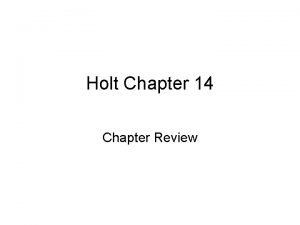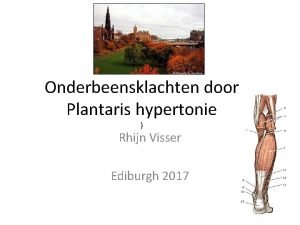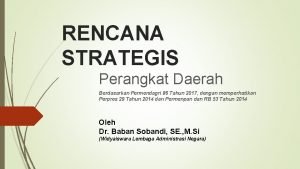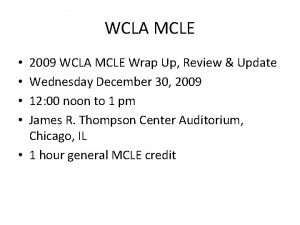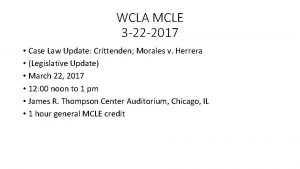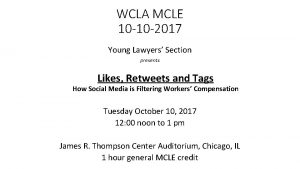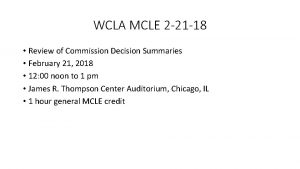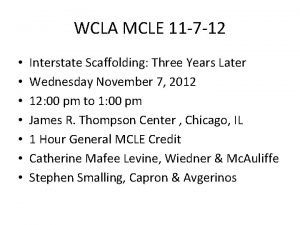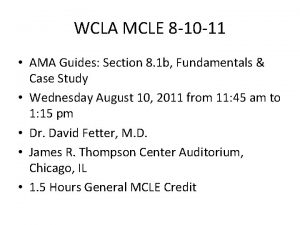WCLA MCLE 8 9 2017 Review of WCLA











- Slides: 11

WCLA MCLE 8 -9 -2017 • Review of WCLA Newsletter: Commission Decisions Update • Wednesday August 9, 2017 • 12: 00 noon to 1 pm • James R. Thompson Center Auditorium, Chicago, IL • 1 hour general MCLE credit

Melanie Martin v. AT&T 15 WC 029983; 16 IWCC 0609 • Petitioner falls on stairs going to get personal cell phone at end of shift • IWCC affirms and adopts Arbitrator’s denial of benefits • Petitioner had already signed out of work, had already walked down the final stairway and was just about the door when she realized she had forgotten her personal cell phone • Petitioner was not carrying anything other than her purse • Petitioner's decision to walk back up the stairs was solely for her own personal benefit • Significant that petitioner never testified that the stairwell was not accessible to the general public. She also clearly testified that she had other access to and from the ground floor and the second floor where she worked, that being an elevator. Petitioner was not instructed by her employer to use the elevator or the stairwell. The choice was hers. • Arbitrator notes that the step on which petitioner alleged she fell did have a small section of the nonslip strip missing. However , the picture shows that the strip was not raised or buckled and in fact even where the piece was missing, the height of the strip was exactly the same as that around the perimeter of the strip, namely 1/ 8". • Based on the above, as well as the credible evidence, the arbitrator finds the petitioner has failed to prove by a preponderance of the credible evidence that she sustained an accidental injury that arose out of and in the course of her employment

John Marsh v. G&D Integrated 14 WC 018122; 16 IWCC 05093 • IWCC affirms and adopts Arbitrator’s award of benefits based on “chain of events” analysis • In the case at bar, it is true that Petitioner did not present any expert opinion that his current condition of ill-being of his left knee, which was symptomatic as many as 7 -10 days prior to the April 2, 2014 accident, is causally related to such accident. • A chain of events which demonstrates a previous condition of good health, an accident, and a subsequent injury resulting in disability may be sufficient circumstantial evidence to prove a causal nexus between the accident and the employee's injury. International Harvester • The Arbitrator finds the treating records , particularly R. X 5, and the testimony of Petitioner to be more persuasive than the opinions of Dr. Walsh. The Arbitrator finds that on April 2, 2014, Petitioner sustained an accident to his left leg that aggravated his pre-existing condition of ill-b eing.

Johnson v. City of Chicago 13 WC 009875; 17 IWCC 0035 • IWCC affirms Arbitrator award of credit for “overpaid TTD or maintenance” • The Respondent seeks a credit for all maintenance paid as it perceives the Petitioner's efforts with regard to vocational rehabilitation to be less than diligent. The petitioner failed to participate in a diligent and good faith job search. Therefore, his claim for maintenance benefits after August 3, 2015 must be denied. • When there is a lack of good-faith" cooperation with vocational rehabilitation efforts, the termination of benefits is justified. Hayden, 214 Ill. App. 3 d 749 (1991). It is the petitioner’s obligation to make “good-faith efforts to cooperate in the rehabilitation effort. ” ADM, 138 Ill. 2 d 107 (1990). • The Arbitrator finds that the Respondent's termination of maintenance benefits as of August 3, 2015 was long overdue. It is difficult to state the specific moment in time when the Petitioner was noncompliant with vocational rehabilitation • No maintenance is awarded and Respondent is allowed a credit for all maintenance paid from September 30, 2013 until August 3, 2015

Andrzej Pawinski v. AT&T 13 WC 041281; 16 IWCC 0623 • IWCC modifies Arbitrator’s PPD award DOWN using 8. 1 b analysis: from 35% leg to 22. 5%; and from 18% MAW to 12. 5% • Respondent sent Petitioner for an AMA impainnent rating. The physician, Dr. Karlsson, found a C lass 0 impairment regarding Petitioner's leg, and found a Class 1 impairment of theright should er and gave Petitioner a corresponding impairment rating of 4% loss of man as awhole. (Respondent Exhibit 1) • In considering the remaining factors, Petitioner was only 30 years old at the time of the accident, with several more working years ahead of him. • He was working in a physically demanding job as a cable splicer when he was assaulted and knocked unconscious. He is currently working as a line man, which per Petitioner's testimony, may be even more physically demanding. • Petitioner's medical records corroborated his injuries and he was consistent with his complaints throughout his treatment. Additionally, Petitioner appeared to be a compliant patient. Although Petitioner was released MMI to full duty, he complains of some residual issues to his shoulder and knee.

Rachel Allen v. Atlas Staffing 15 WC 039401; 16 IWCC 0701 • IWCC affirms Arbitrator’s award of benefits to Petitioner who was victim of horseplay • Petitioner, denied this was consensual horseplay, and the written statement, admitted as Respondent' s exhibit, supports Petitioner's testimony that the incident occurred without warning. No evidence was introduced to contradict Petitioner' s testimony as to what occurred. • The Arbitrator notes that Illinois permits the nonparticipating victim of horseplay to recover worker' s compensation benefits if the horseplay occurs within the course of employment. Murray, 163 Ill. App. 3 d 841 (1987) • Petitioner was injured by an act of uninvited horseplay while in the course of her employment and therefore the injury arose out of and in the course of her employment

Lori Crowder v. City of Springfield 14 WC 015569; 16 IWCC 0656 • IWCC affirms and adopts Arbitrator’s denial of benefits to Petitioner who was leaving building to get coffee (2 -1 decision with dissent) • The arbitrator finds the petitioner's injury resulted from a personal risk, and that the general public was exposed to the identical risk. • Although petitioner had access to coffee in the Municipal Center West, and could use either the east or west exit to get to Starbucks in approximately the same amount of time, the petitioner decided to go to Starbucks via the entrance accessed equally by the general public and slipped on a snow covered walkway • Given the fact that going for a latte at Starbucks within one hour of beginning her work day was personal to the petitioner since coffee was available in the Municipal Center West, the arbitrator finds the petitioner's risk of injury was not a neutral risk. • Dissent: Petitioner was exposed to a greater risk than the general public because she regularly used the entry and walkway where she fell while on break. Petitioner's injuries also arose out of her employment under the personal comfort doctrine.

Lisa Eller v. Parkland College 14 WC 033344; 16 IWCC 0654 • IWCC affirms Arbitrator’s award of benefits in parking lot case • Petitioner was permitted to park in any of the outlying parking lots, including the one in which she fell which is closest to office • Key question is “whether parking lot is maintained by Respondent and provides the lot for its employees use • Treated the same as if it were the employer’s premises and a “hazardous condition” such as the ice encountered by Petitioner supports the finding of a compensable claim • Relies on Mores-Harvey, 345 Ill. App. 3 d 1034 (2004)

Maricruz Lopez v. Debbie’s Customized Staffing 12 WC 011027; 16 IWCC 0647 • IWCC modifies Arbitrator’s award of TTD DOWN • Upon reviewing the evidence in the record the Commission finds that there is clear evidence that Petitioner was not complying with the treatment plan set forth by Dr. Fernandez. • She voluntarily removed herself from Respondent 's employment and she did not look for work on her own. • On March 19, 2013, Dr. Fernandez sent a note indicating that Petitioner has missed her last appointment and indicating that s he should set a new appointment. (TTD terminated March 20, 2013). • Respondent shall authorize, approve and pay for the MRI arthrogram as ordered by Dr. Fernandez and any such related medical care under § 8 (a) and § 8. 2 of the Act.

Creed Bevolo v. Continental General Tire 15 WC 002506; 16 IWCC 0669 • IWCCC vacates award of mileage/travel expenses (2 -1 with dissent) • The Arbitrator allowed Petitioner's request for travel expenses and ordered Respondent to reimburse Petitioner for mileage of$609. 50 for 5 round trips to Dr. Paletta, a total of 1, 060 miles at 57. 5 cents per mile. • Petitioner acknowledged he could have found a physician in the Mt. Vernon area should he have chosen not to travel • WCA does not specifically provide for reimbursement to injured workers for travel expenses related to medical treatment. Illinois courts have held that an injured worker may receive reimbursement for medically related travel expenses if the Petitioner can show that the trip was necessary because the type of medical treatment sought was not available in their local area. " See Schmidt v. Salem Bowl, 10 IWCC 1059

Anthony Bulvan v. Pepsi 12 WC 028080; 16 IWCC 0665 • Considering the issue of "Petition to Rescind Settlement Agreement” and being advised of the facts and law, denies Respondent's Petition to Rescind Settlement Agreement • Respondent asks that the settlement agreement be rescinded based on an additional document or agreement that is not in evidence. Respondent does not cite any Commission precedent or case law that would allow it to rescind a contract under these circumstances. It is not alleging that there was a clerical or typographical error. Nor is Respondent arguing that there was a mutual mistake. Rather, Respondent argues that the contract, which it prepared, is incomplete and missing some terms. However, this is due to Respondent's choice to write the contract without referencing this other side agreement and remaining silent about that issue. • Commission has discretion over the approval of settlement agreements and this presumes that all of the terms of the settlement are included in the contract. Whether it is appropriate for a respondent to include such ancillary agreements in a workers' compensation settlement does not need to be decided here. However, we find that it is inappropriate for Respondent to now claim that it really didn't agree to what it agreed to, as evidenced by the contract, because of terms and conditions that it chose not to include in the contract.
 What is inclusion and exclusion criteria
What is inclusion and exclusion criteria Chapter review motion part a vocabulary review answer key
Chapter review motion part a vocabulary review answer key Narrative review vs systematic review
Narrative review vs systematic review Writ of certiorari ap gov example
Writ of certiorari ap gov example Narrative review vs systematic review
Narrative review vs systematic review Sararon
Sararon Plantaris hypertonie
Plantaris hypertonie Icass practical assessment task 1 2017 memorandum
Icass practical assessment task 1 2017 memorandum Permendagri 86 tahun 2017 ppt
Permendagri 86 tahun 2017 ppt Abdelaziz bouteflika nobel peace prize 2017
Abdelaziz bouteflika nobel peace prize 2017 Odag sh
Odag sh Forrester wave identity management and governance
Forrester wave identity management and governance

